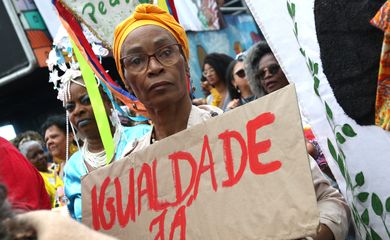Protesters in Copacabana call for end to violence against women

On the promenade of Rio’s Copacabana Beach, 164 pairs of women’s shoes laid out side by side represented the victims of femicide—cases in which people are killed because they are women, a form of gender discrimination. In the state of Rio de Janeiro, cases totaled 111 in 2022 and 53 in the first half of this year.

“It’s an act of remembrance and a tribute meant to raise awareness about this epidemic of violence against women whose epitome lies in femicide,” visual artist Marta Moura, rally coordinator and a representative of the Levante Feminista RJ collective, told Agência Brasil.
Escalating violence
Data from the Brazilian Public Security Forum show that, in the first half of 2023, the number of femicides in the country rose by 2.6 percent compared to the same period in 2022. Victims numbered 722. The number of rapes surged by 14.9 percent. Reports totaled 34 thousand—the equivalent of one every eight minutes.
The National Survey on Violence against Women, which heard 21,700 people and was released last Tuesday (Nov. 21) by the Federal Senate, revealed that 30 percent of women in the country have suffered some kind of domestic or family violence caused by a man. Of them, 76 percent faced physical violence.
In Moura’s view, the results disguise underreporting. “We have evidence that they are higher because many women experience violence—sexual and domestic violence, for example—and don’t go as far as filing a police report,” said the activist, who witnessed as a child the attempted femicide of her mother by her father.
Statistics reveal that the pain of this kind of violence is more prevalent among black women. An Amnesty International survey found they account for 62 percent of femicide victims.
“We are the most vulnerable women in Brazil’s entire social structure—which is white and sexist,” said Raquel Matoso, a representative of the Black Evangelical Movement. Violence, she pointed out, is more present when cross-cutting issues are at play—“especially black lesbian women, and black trans women,” she went on to say.




